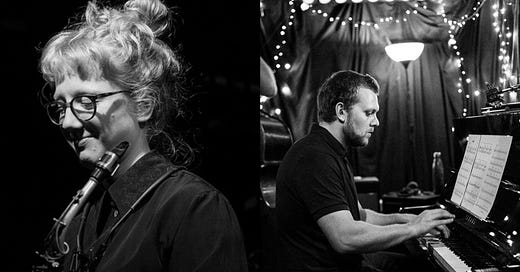Harry Mitchell Quartet with Flora Carbo
Thoughts on a recent live set and a new album from a related project, Ben Witt's GunFu.
I was fortunate enough to catch the first set of the Harry Mitchell Quartet’s gig at The Ellington Jazz Club in Perth last week. Their special guest was the intrepid saxophonist Flora Carbo, visiting from Melbourne. The quartet comprised Mitchell on piano, his long-time co-conspirators Karl Florisson and Ben Vanderwal on double bass and drums respectively, and a newer collaborator, guitarist Ben Witt.
Mitchell works purposefully and prolifically across genre boundaries. He has released four albums in the last two years, all with Florisson and Vanderwal: two live albums of standards featuring saxophonist James Sandon; a compelling set of Jung-inspired contemporary jazz compositions for quintet with trumpeter Ricki Malet and saxophonist Jamie Oehlers; and an album from his Quiet Country project, which performs his arrangements of country, rock, and pop songs.
The quartet gig with Carbo was the premiere of Mitchell’s latest original compositions. The opener combined a twisting melody in fluctuating tempo with warm, gospel-tinged harmony, like a hymn in free verse. Carbo shone in this setting; her abstract, elongated phrases spiralling gracefully in liminal space.
Mitchell explained that this first piece, “Palindrome 1”, was part of a series he had written with palindromic melodies (which sound the same when played backwards). During the first set Mitchell also premiered the second, fourth, and sixth pieces in the series. The most impressive thing about these compositions is that, with perhaps the exception of the first, they don’t sound “conceptual”. They’re an admirable balance of engaging and accessible; their self-reflexive melodies offset with beguiling grooves and engrossing vamps.
“Palindrome 2” was a particular highlight. Over Vanderwal’s straight-eighths, Carbo pushed at both ends of her instrument’s range, alternating strong, succinct declamations with winding chromatic digressions. Mitchell took an especially lyrical solo, deftly sequencing and connecting tuneful ideas, before Vanderwal capped the piece with some elegant rhythmic moves over and around a repeated stop-start ensemble phrase.
I never tire of seeing Ben Vanderwal play the drums. It seems like there’s no musical setting he can’t enhance with his facility, playfulness, and ear for textural nuances. He brought a small leather suitcase of drum paraphernalia to this gig: shakers, cymbals, and other small objects that buzz, click or ring when placed on a drum or attached to a limb. He arranged several of these devices on his drumheads after “Palindrome 2” ended and Mitchell announced “Palindrome 4”.
Mitchell informed the crowd that Vanderwal’s rehearsal notes had inadvertently christened this tune “Plink Plonk”. The reason for that note became apparent as Vanderwal began to gently tap out a delicate groove with brushes on his augmented kit. After this smooth introduction, Witt picked out spiky single note lines over a two-chord vamp. Later, Witt and Carbo exchanged angular phrases, the former utilising a striking reverse delay effect - a neat conceptual fit with Mitchell’s overarching palindrome concept.
Witt has had an impressive career, from early success with his acclaimed indie-rock band The Chemist, through to his more recent work as an eclectic solo artist and hired gun for the likes of POND and Empire of the Sun. By “Palindrome 4”, I could hear why Mitchell wanted him for this project; his idiosyncratic approach to the guitar, drawing on a range of influences outside of jazz, undoubtedly enriched the music.
Florisson contributed a soulful introduction to the only asymmetrical tune in the set, Mitchell’s “Song #8”. He drew in the crowd with plaintive slides and a warm tone. For the rest of the set, he melted into the foundation of the music, locked in a fluid dance of give and take with Vanderwal in which he never missed a step.
I didn’t catch the second set, which Mitchell promised would feature pieces with more evocative titles, so I was happy to hear that he was in the studio with the quartet and Carbo last week recording the new music. I recommend keeping an ear out for the eventual release.
As I was thinking about Mitchell’s new music and Witt’s contribution to it, it occurred to me that it’s rare to see a musician from outside the Perth jazz scene participate in a project situated within it. Witt is something of an exceptional case, given that he’s a tertiary-educated musician who has worked at the intersection of popular music and art music for some time. There are practical reasons you don’t see more indie-rockers on jazz gigs; the more firmly rooted in the jazz tradition your project is, the less likely it is that someone without a grounding in that tradition will be able to meaningfully participate. Still, it’s worth thinking about what other exciting music might flower as a result of more cross-pollination between scenes.
Witt and Vanderwal are both doing promising work of their own in this space. Last week, Witt released the debut album from his latest project, GunFu, which also features Mitchell and Vanderwal, together with bassist Marc Earley and saxophonist Jayden Blockley. The album is a collection of instrumental tracks written by Witt that were originally commissioned for an art exhibition. It’s a gratifying mix of canny, groove-based composition and fiery improvised solos, infused with the sable hues and crunchy textures that permeate Witt’s recent solo work (he also mixed the album).
Vanderwal has enlisted Witt for his latest venture, Edward, along with The Cat Empire’s Grace Barbé on bass and jazz trumpeter Jessica Carlton. I haven’t had the pleasure of meeting Edward yet, but an upcoming spiritual jazz jam at The Ellington will provide an opportunity to make his acquaintance.





